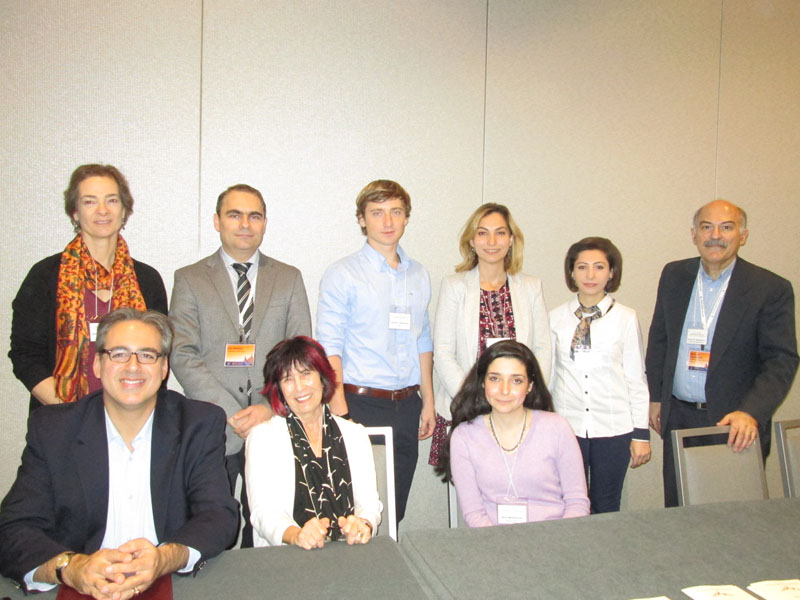‘Armenians in America’ Conference Held in Boston
January 13, 2017BOSTON, Mass.—The Society for Armenian Studies (SAS) held an interesting and informative conference entitled “Armenians in America,” on Nov. 17, 2016, in Boston, Mass. The conference was held in conjunction with the SAS Annual Membership Meeting and Middle East Studies Association Annual Conference.

(Front row, L-R) Marc Mamigonian, Carel Bertram, and Helen Makhdoumian. (Standing, L-R) Margaret Manoogian, Vahe Sahakyan, Anatolii Tokmantcev, Shushan Karapetian, Sona Nersisyan, and Barlow Der Mugrdechian.
SAS President Prof. Barlow Der Mugrdechian opened the conference welcoming the participants, members of the SAS, and a large number of local Armenians. This is the third consecutive year that SAS has been holding conferences on specific themes in conjunction with the annual meeting.
In the first panel on “Travel, Collective Memory and Homeland among Armenian-Americans,” chaired by Marc Mamigonian (National Association for Armenian Studies and Research, NAASR), four participants presented papers.
Dr. Margaret Manoogian (Western Oregon University) discussed her research related to how Armenian travelers to historic Armenia expressed their attachment to their ancestral villages in her talk on “Connections for Families Disrupted: Travels to Anatolia by Diasporans.” She based her research on interviews with those who had traveled to Turkey with Armen Aroyan over the past decades. Dr. Manoogian conducted her research in cooperation with Dr. Anny Bakalian (Emerita Associate Director MEMEAC, CUNY).
Dr. Carel Bertram (San Francisco State University) approached the question of how music plays an important role in identity through her talk “Coming to Terms with Home and Homeland.” She discussed how music is one marker that acts differently than words to open up new areas of spatial consciousness. Music and dance bring to life the village-family relationship. Her work was based on her own travel to historic Armenia as well as ethnographic research with those who traveled to Turkey with Aroyan.
Sona Nersisyan’s talk focused on “Homeland Perception and Identity Construction: The Case of Los Angeles Armenian Community.” She explored the Homeland-Diaspora links, and concluded that the Diaspora identity is a multi-layered one, with perceptions of homeland often connected to language and literature. Nersisyan is a scholar with the Institute of Archaeology and Ethnography, National Academy of Sciences of Armenia.
In the second panel on “Diversities of Armenianness in American and Diasporic Contexts,” chaired by Dr. Vahe Sahakyan (University of Michigan, Ann Arbor), Anatolii Tokmancev (UCLA) presented a talk on “Armenian Jehovah’s Witnesses: Nationalism in a Strictly Non-Nationalist Sect.” His approach was to understand how affiliation with the Jehovah’s Witnesses affects Armenian identity. His research among the Glendale Armenians explored how ethnicity is not only a quality, but offers a perspective on the world.
Dr. Shushan Karapetian (UCLA) discussed how second and third generation Armenians in America approach the question of Armenian language acquisition in her paper on “Language in Diaspora: Problematizing Ideology, Identity, and Symbolism.” America is a predominantly monolingual society and thus she explored the impact of this on how Armenians acquire language. Her work assessed the overall landscape of the Armenian language in Los Angeles and evaluated how the language is being used in schools and in the community.
Helen Makhdoumian, a graduate student at the University of Illinois, Urbana-Champaign, spoke on “Inheritance of Exile: Negotiating Memory, Home, and Belonging in Armenian-American Literature about the Lebanese Civil War.” Makhdoumian utilized Patricia Sarrafian Ward’s novel The Bullet Collection (2003) to explore the nexus between memory and migration. The Armenian Genocide plays a significant role in this exploration of changing perceptions and identities.
The Society for Armenian Studies is headquartered at the Armenian Studies Program at California State University, Fresno and its website is at societyforarmenianstudies.com. The SAS can be reached by email at barlowd@csufresno.edu or by phone at 559-278-2669.
Source: Armenian Weekly
Link: ‘Armenians in America’ Conference Held in Boston